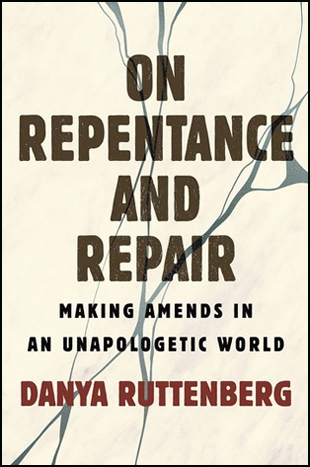Danya Ruttenberg is a rabbi and spiritual teacher with the ability to speak to a broad audience on matters of the utmost importance.
In the language of our Alphabet of Spiritual Literacy here at S&P, what’s essential to Ruttenberg is how spiritual practices combine. She wants to make clear, there is no real forgiveness without listening and justice — and justice involves repair. Ruttenberg writes, “There should never be pressure on victims to forgive. Ever.” For forgiveness to be real, it must represent meaningful repair and change. Victims of harm are too often forced to forgive, and perpetrators of harm are too often allowed to forgive in simple words and empty sentiment.
Ruttenberg writes: “All too often in our culture, forgiveness granted to an unrepentant perpetrator — or to a partially repentant perpetrator, or to one whose inner work is unclear but who can write a compelling social media post expressing regret — is conflated with absolution.”
When we do wrong to another we need to not simply ask for forgiveness, but do the work of transformation and personal change by making amends, aiming to become “the kind of person who doesn’t do that harmful thing anymore.” Even worse, in our dysfunctional cycles of incomplete or pretend forgiveness, is when we blame the victim: “the hard emotional labor is foisted upon the victim, and little to nothing is asked of the perpetrator or the systems that produced the harm.”
Ruttenberg applies these teachings to instances when our institutions need to seek forgiveness (chapter 4), when our nation needs to be forgiven (chapter 5), and in our courts and justice systems (chapter 6). She also offers wisdom on true repentance in personal relationships (chapter 2).
Ruttenberg is skilled at choosing examples from the headlines and popular culture — for instance, when actor Kevin Spacey is accused of sexual assault and when comedian Amy Poehler mocks a disabled girl on Saturday Night Live.
Ruttenberg’s teaching is informed by a deep immersion in classic Jewish texts such as Maimonides, Talmud, and Mishnah, and Christian authors including Dietrich Bonhoeffer on the subject of “cheap grace.” When discussing the history of white racism in America, Ruttenberg quotes both abolitionist Frederick Douglass and our contemporary, Rev. Dr. Kelly Brown Douglas. Twelve-step programs also are offered as examples of practicing forgiveness with true repentance — and for understanding how repentance should include self-care.
The great twelfth-century philosopher, Maimonides, is quoted more often than other teacher. Quoting him, Ruttenberg says, “Some of the demands of the deep work of transformation might include ‘crying out in tearful supplication, giving alms according to one’s means, distancing oneself exceedingly from the thing causing the sin … to change one’s identity and … conduct … and exiling oneself from the place of residence … because it leads them to submissiveness and to be meek and humble-spirited.”
